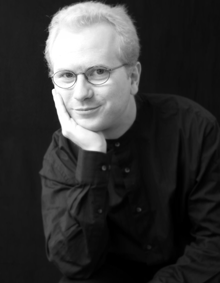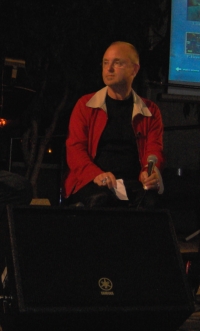Our regular (well, semi-regular, at least until our dust has settled in Houston) listen to and look at living, breathing composers and performers that you may not know yet, but I know you should… And can, right here and now, since they’re nice enough to offer so much good listening online:
Amos Elkana (b. 1967 — US / Israel)
 Born in Boston and a product of Berklee, the New England Conservatory and Bard, Amos now makes his home in Tel Aviv. He was one of the brave few “serious” composers that took the online plunge early; I first bumped into him and his music way back in 1999 or 2000 on the old MP3.com. His work has a touch of the modern Romantic, chromatic and sharp, though the lyrical is never too far away.
Born in Boston and a product of Berklee, the New England Conservatory and Bard, Amos now makes his home in Tel Aviv. He was one of the brave few “serious” composers that took the online plunge early; I first bumped into him and his music way back in 1999 or 2000 on the old MP3.com. His work has a touch of the modern Romantic, chromatic and sharp, though the lyrical is never too far away.
The website linked above gives a great introduction to Amos and his music. You can read about some of his composing techniques, snag a CD or two, and the works page contains numerous full-length MP3s of all kinds of pieces (some with PDFs of the scores), including his award-winning Arabic Lessons for three sopranos and chamber ensemble (though you shouldn’t forget to catch the piano piece Eight Flowers as well).
 Attention Boston (and NY) shoppers! The world-premiere run of David Salvage’s String Quartet No. 2 is at hand. The
Attention Boston (and NY) shoppers! The world-premiere run of David Salvage’s String Quartet No. 2 is at hand. The  “But he, Siddhartha, where did he belong? Whose life would he share? Whose language would he speak?” These words of Hermann Hesse depict Siddhartha Gautama (Buddha) at a pivotal point in his quest to find purpose in the world. He will soon find it, seeing one where he once saw many, finding that the seemingly unrelated are related.
“But he, Siddhartha, where did he belong? Whose life would he share? Whose language would he speak?” These words of Hermann Hesse depict Siddhartha Gautama (Buddha) at a pivotal point in his quest to find purpose in the world. He will soon find it, seeing one where he once saw many, finding that the seemingly unrelated are related.
 Composers, painters, writers, the whole motley lot–have always depended upon the kindness of strangers. Timely financial interventions of the Lorenzo de’ Medici here, the Nadezda von Meck there, the Paul Sacher over there have greased the skids for the makers of many of the world’s great masterpieces. Alas, those sort of patrons aren’t that plentiful nowadays and so a new “community” model of patronage has sprung up in which arts organizations pool their resources to commission new works. I call it the “Biegel” method after S21 blogger and pianist
Composers, painters, writers, the whole motley lot–have always depended upon the kindness of strangers. Timely financial interventions of the Lorenzo de’ Medici here, the Nadezda von Meck there, the Paul Sacher over there have greased the skids for the makers of many of the world’s great masterpieces. Alas, those sort of patrons aren’t that plentiful nowadays and so a new “community” model of patronage has sprung up in which arts organizations pool their resources to commission new works. I call it the “Biegel” method after S21 blogger and pianist 